Outcry over 'forgotten' communities in the remote Yorkshire Dales as debate unfolds over power outages
Most folks make ready for what winter brings. They have snow shovels and food stocks and a network of neighbours to call.
But when Storm Arwen hit, it tore out all safety nets. No power meant no heating for many, no water, no phone signal or internet. Ultimately, no contact with the outside world.
Advertisement
Hide AdAdvertisement
Hide AdOn the outskirts of Keld, in the far reaches of Swaledale, Pat Coates watched from the window of the family farm as power lines lay wrecked in their field.
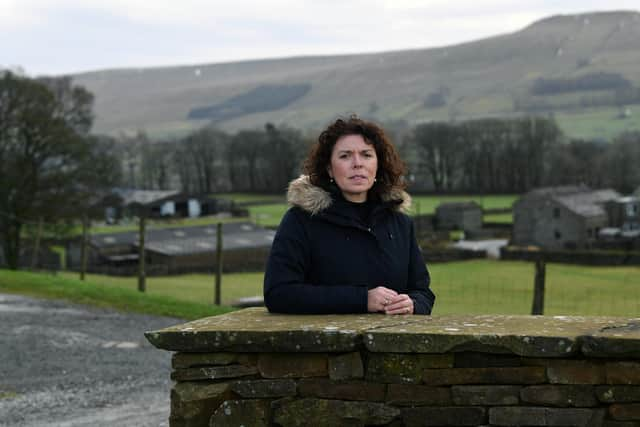

It was an “impossible task” to reach everybody, she said, so they waited it out.
Hunkered in one room with her son’s young family, around a gas fire the Government wants gone, she was struck by how vulnerable they were.
“What are we going to keep warm with, when it’s all gone?” she said.
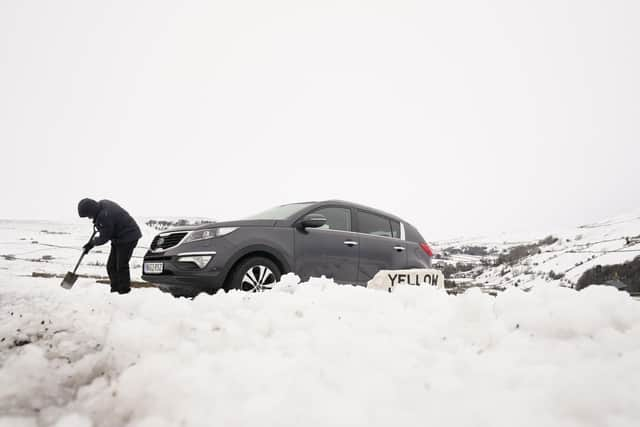

Advertisement
Hide AdAdvertisement
Hide AdThe full force of Storm Arwen’s wrath struck on the night of Friday November 26. The destruction of electricity lines across the North of England was said to be the worst in 25 years.
A day later, some 155,000 homes were still without electricity. In the Yorkshire Dales, it was tiny hamlets and farms that found themselves still without power.
Down in Simonstone near Hawes, there are only a handful of homes. This is a hardy county, and people are well used to being self-sufficient, long embattled by forces beyond their control.
To Claire Moore the winds had seemed no stronger than usual, and she settled down with her daughter to wait out the worst.
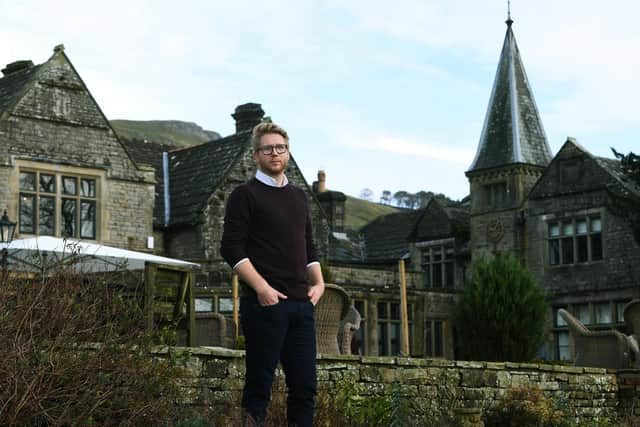

Advertisement
Hide AdAdvertisement
Hide AdBy 10.30pm the power was out. Still buoyant, they brought out candles and lanterns. Their home, an eco-barn with its own ground-water heating, was still cosy and warm.
But the water is linked to the electricity, so when it went they lost both and heating as well. Then the phone signal, with no mobile mast, and they realised they were entirely alone.
Cold takes hold
Mrs Moore’s husband died five years ago. They had built the barn together and considered a log burning stove, but it was so well-insulated and secure. Now she wishes she had.
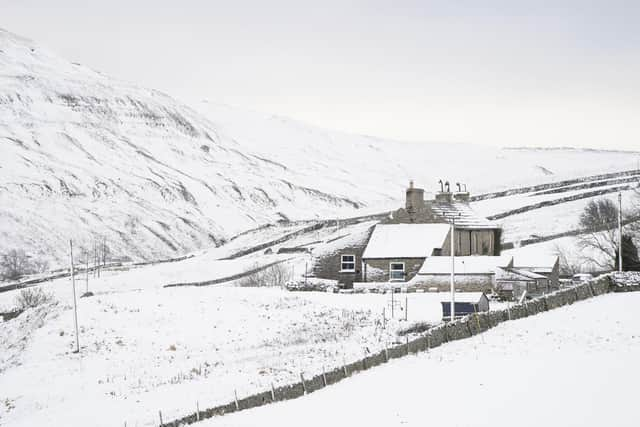

“By Sunday it was absolutely freezing,” she said. “It was just lifeless, so cold.”
Advertisement
Hide AdAdvertisement
Hide AdA friend nearby lent them a holiday cottage. They couldn’t get the car down the drive in the snow, so they walked. They were entirely cut off for four days.
In a city there might be shelters, a taxi, a place to charge a phone. Mrs Moore, who works at Hawes Post Office, used its landline to call power companies.
She was met with an automated message, she said, and it was Tuesday before neighbours heard word that a downed pole was to be fixed.
“It seemed nothing was ever mentioned about Simonstone,” said Mrs Moore, aged 50. “We have to be hardy up here, but it was horrible. It’s that loss of contact, the not knowing.”
Turning guests away
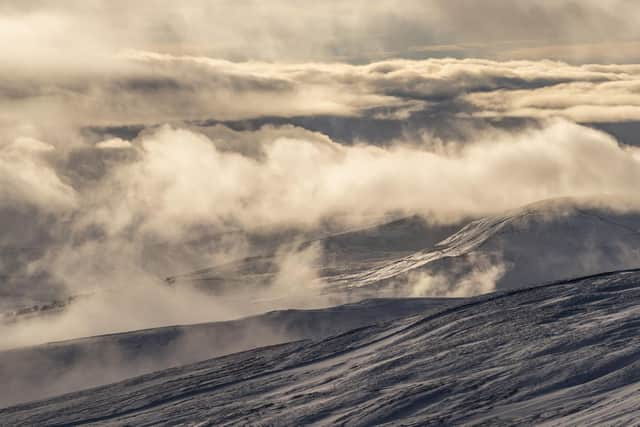

Advertisement
Hide AdAdvertisement
Hide AdOver the road, Jake Dinsdale is managing partner of the country house Simonstone Hall, which had a full guest list that night. When they woke it was desperately cold.
Guests, thinking it wouldn’t be long, went for a walk, but then almost all went home.
Only one family stayed, having travelled from Kent with two young boys, desperate to be reunited with their grandfather before Christmas.
To them it was an adventure, said Mr Dinsdale. Fires were lit, fish and chips served, and card games played to keep the kids entertained. Staff did what they could.
Advertisement
Hide AdAdvertisement
Hide Ad“Up here in the sticks, we’re pretty resilient,” he said. “We’re well equipped to deal with small crises as they come. We handle it. You get up and go again.
“The worst thing was how demoralising it was, when you have to turn people away.”
Immeasurable cost
Power companies worked “all hours” to get lines back up, Mr Dinsdale said, praising their efforts while the winds blew and snow fell and temperatures dipped below freezing.
But the costs are “immeasurable”. Loss of business, staff that still had to be paid. Cancellations, and untold missed bookings, with all phone lines and internet down.
Advertisement
Hide AdAdvertisement
Hide AdThen when the lights came back on, five days later, all stock was destroyed. In fridges had been produce from two rare-breed pigs he had reared through the year, Boris and Donald.
That hurt, he said. Now there are insurance challenges. He was given a cheque for £280 by the power company.
“It’s insulting,” said Mr Dinsdale. “It does feel like the infrastructure, particularly in rural areas like this where we need it most, is forgotten.
“Once again, it’s the forgotten North. Once again, it’s the small businesses. Why do we always come last?”
Inventive
Advertisement
Hide AdAdvertisement
Hide AdBack in Keld, Mrs Coates is resilient. They have long learned to be inventive here.
When they lost TV signal, they self-funded a mast, then a neighbour set up a not-for-profit cluster internet hub. There is no phone signal for four miles.
With farmer husband Alan she lives in a cottage close to their son’s young family at Aygill Farm, but it’s half a mile to a neighbour.
Calls are by wifi, but when the power goes, so does internet. They keep an old plug-in phone, but it is costly and soon to disappear. Copper wires look to be replaced by fibre optics.
Advertisement
Hide AdAdvertisement
Hide AdMrs Coates is afraid. She has a year, she believes, before they lose the emergency landline.
It matters because her youngest grandson, born in July, has muscular dystrophy. He may need breathing support, he will need to be warm.
“No power means no communication,” she said. “If we have another storm, we will have nothing. We are an hour-and-a-half from the nearest hospital.”
Plea
These hill farming communities are tough, said Mrs Coates, who with her husband can chart their families’ history back generations in this area.
Advertisement
Hide AdAdvertisement
Hide Ad‘Hefted’, is the word she used, referring to the sheep they breed as rooted to the land; entrenched and immovable.
“Born and bred, they are a part of this land,” she said. “It’s in their blood. If we lose these hill farmers, what happens?
“We try to be strong, as that’s what we are. But how much do they want to batter us down?”
Mrs Coates, 56, had never written to an MP before but she has sent a letter to Rishi Sunak.
Advertisement
Hide AdAdvertisement
Hide Ad“I’m not good at writing letters,” she said. “Sometimes you have to stand on the parapet and shout.
"We are survivors, we are tough. But how do I cover my family in an emergency?”
_______________________________________________________________________________________
Support The Yorkshire Post and become a subscriber today. Your subscription will help us to continue to bring quality news to the people of Yorkshire. In return, you'll see fewer ads on site, get free access to our app and receive exclusive members-only offers. Click here to subscribe.
